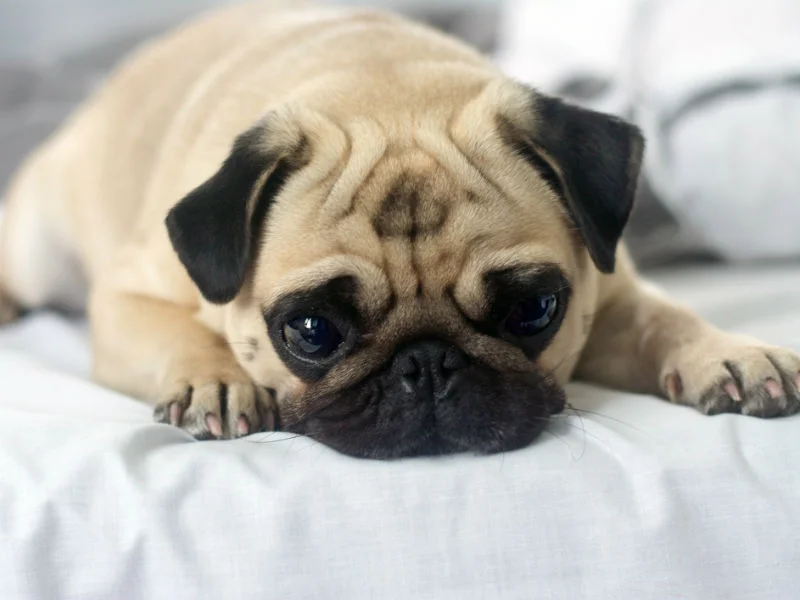Does my Puppy Have Canine Parvovirus?
My Experience Owning a Puppy with Parvovirus
Many years ago, I gave in and took home my first purebred dog - a gorgeous black Standard Poodle puppy named Marquis. I worked a lot of hours as a young veterinarian, so I kept my poodle with me at the clinic. After his second set of puppy vaccines, including the Parvovirus vaccine at 14 weeks of age, I believed it was safe to expose Marquis to other dogs. I went away for a weekend and left Marquis to board at the clinic. A week later, he began to vomit and have bloody diarrhea. I tested his stool for Parvovirus and it was positive. After days of hospitalization on intravenous fluids and intensive care and treatment, including emergency care at night in a separate 24-hour facility, my dog recovered. He was lucky.
His condition could have easily been fatal, since only 50-70% of cases of Parvo in dogs survive, even when hospitalized with expensive round- the-clock intensive care. With less expensive home care, less than 50% survive.
What are the Canine Parvo Symptoms?
Canine Parvovirus (CPV) is a highly contagious virus that is believed to stay viable in soil for up to a year. The most common form is the intestinal variety. Less often, it will affect the heart of very young puppies, causing sudden death.
Parvo in puppy symptoms in the intestinal form are vomiting, severe bloody diarrhea, dehydration, loss of appetite, lethargy and weight loss. The virus usually affects puppies between six weeks and six months of age.
A puppy can become dehydrated and weak very quickly due to the effects of the virus on the intestine’s ability to absorb fluid and protein. Fever and abdominal pain may be present. If the puppy is severely dehydrated, a low body temperature may result, as well.
How is Parvovirus Spread?
Large concentrations of the Parvovirus are found in the stool of infected dogs, so other dogs can contract CPV by sniffing another dog’s anus or stool. Puppies at highest risk for exposure to CPV are those who have spent time in animal shelters, breeding kennels and dog parks, where many non-vaccinated or incompletely vaccinated puppies are in close proximity to each other.
Are Certain puppy Breeds More Likely to Get Parvovirus?
Rottweilers, Pit Bulls, Labradors, Dobermans, German Shepherds, English Springer Spaniels and Alaskan Sled dogs are more susceptible to canine Parvovirus than other dog breeds.
How Can You Minimize the Chance of Your Puppy Getting Parvo?
Getting vaccinations by a veterinarian according to the appropriate schedule is essential in preventing CPV. We should not necessarily assume that the vaccines given by every breeder, shelter or adoption organization were stored in the appropriate conditions and given prior to their expiration date or given on the recommended schedule. We can, however, trust records provided by a veterinarian in the paperwork given to you when you acquire your puppy. If there is any question about the accuracy or validity of the information you provide at the time of the initial puppy exam, it is safest to start the vaccinations over.
It is recommended in the standards of care for veterinarians that we give a combined distemper, hepatitis, Parvo and Parainfluenza vaccine beginning at 8 weeks of age and then repeat this vaccine every 3-4 weeks until the puppy is 16 weeks of age. It is safe to carry the puppy out to clean concrete to eliminate or you can provide pee pads indoors only until all vaccines are completed. Do not allow your puppy to have direct contact with any other dogs unless you are certain that their vaccines are current.
CPV is resistant to weather changes and most cleaning products. Only concentrated bleach has been shown to deactivate Parvovirus. Disinfect all bowls, toys, beds and surfaces with bleach if you suspect Parvo in your puppy, especially if you have other dogs in the home. If a puppy in your house dies of Parvo, it is best not to get another puppy for several years. It is only after the final vaccine at 16 weeks of age that your puppy is safe to have direct contact with dogs of unknown vaccination status. It is also imperative that you don’t allow your puppy to walk where other dogs have eliminated or on any soil until all vaccines are completed. Remember that CPV can remain alive in soil for up to a year.


